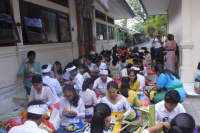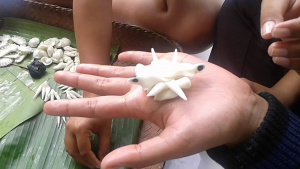"Saraswati is essentially an Indian deity, and has for centuries been integrated into the Balinese system of beliefs that has for the last few decades acquired the appellation “Hindu Bali”. Long before the term “Hindu” came to be used in India itself (in the late 18th early 19th century by Christian missionaries and ‘Hindu” reformists) Saraswati had been venerated in various traditions.
In fact Saraswati is also venerated in various ‘Northern’ or Mahayana Buddhist traditions, including Tibet (Yang Chen-mo), China (Tapien-ts’ai t’iennu), Mongolia (Keleyin ukin Tegri), and Japan (Benten). Here in Bali the tradition has evolved into integrating the day to make prayers to the goddess into the pawukon calendar which cycles every 6 ‘months’, in fact 6 months of 35 days. So Saraswati day, like so many other Balinese ceremonial days, comes around every 210 days. Today, in fact.
_RIO8034
The Balinese follow the “Hindu” tradition in considering Saraswati to be the sakti or consort of the god Brahma. In essence, here Saraswati is worshipped as the Goddess of Learning. On this day holy books and lontar (palm leaf texts) are venerated with special offerings; school children gather outside their classes in the morning and pray to her.
Saraswati is considered not only the goddess of learning, but also a source of spiritual inspiration and motivation, as well as creativity in the arts. On the night of Saraswati the tradition is to stay up and read the sacred lontars. Then the following morning at dawn, the day of “Banyu Pinaruh” one goes to a sacred bathing spot or to the sea and performs ritual ablutions of purification.
Again, the depictions of Saraswati here follow the Indian traditions. She has one face and four arms. She is seated on a white swan, which in Indian traditions is considered special as swans are said to have the ability to separate milk from water when they are mixed; in other words to separate what is pure from the impure.
In her top right hand she carries a veena, an Indian musical drone instrument that represents the arts and the sacred sound AUM. In the other right hand she carries a ganatri rosary symbolizing spiritual wisdom. One of her left hands is also playing the veena, while the other holds a sacred text symbol of learning.
Saraswati day: a day to remember the importance of learning, a day for spiritual motivation, a day for creative inspiration. Have a great day."









Enable comment auto-refresher